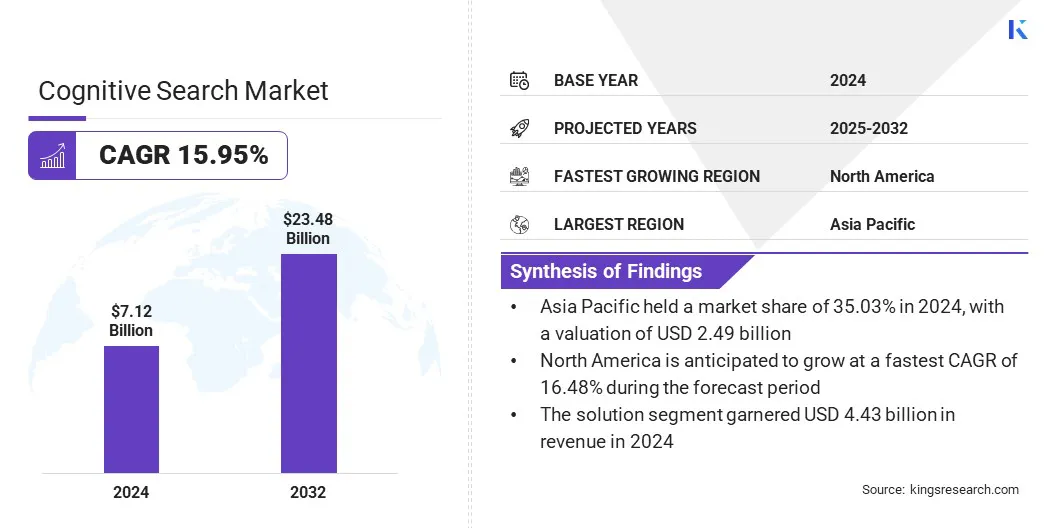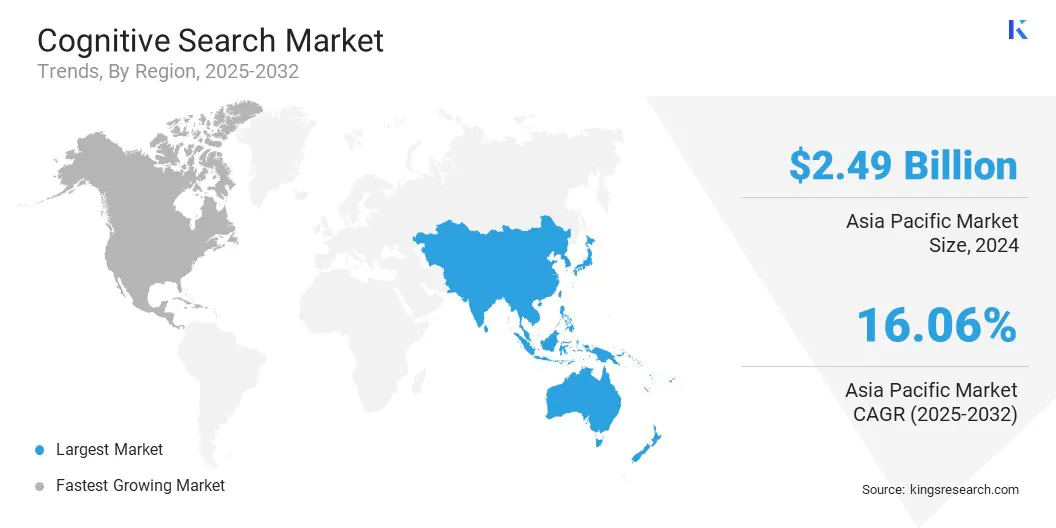buyNow
Cognitive Search Market
Cognitive Search Market Size, Share, Growth & Industry Analysis, By Component (Solution, Services), By Organization Size (Large Enterprises, Small and Medium Enterprises), By Vertical (Healthcare, BFSI, Retail, Education), and Regional Analysis, 2025-2032
pages: 170 | baseYear: 2024 | release: July 2025 | author: Versha V.
Market Definition
Cognitive search is an advanced information retrieval method that uses artificial intelligence (AI) technologies such as natural language processing (NLP), machine learning, and semantic analysis to deliver contextual and accurate results.
By understanding user intent, context, and content meaning, it allows precise information discovery across both structured and unstructured data sources such as documents, emails, databases, and websites. Widel used in enterprise settings, it enhances productivity and supports informed decision-making processes by uncovering insights from large datasets.
Cognitive Search Market Overview
The global cognitive search market size was valued at USD 7.12 billion in 2024 and is projected to grow from USD 8.20 billion in 2025 to USD 23.48 billion by 2032, exhibiting a CAGR of 15.95% during the forecast period.
This growth is driven by the rising adoption of AI-powered tools that enhance search accuracy and contextual understanding across enterprise environments. This growth is further supported by the integration of generative AI into search platforms to improve discovery and speed up decisions.
Key Highlights:
- The cognitive search industry size was valued at USD 7.12 billion in 2024.
- The market is projected to grow at a CAGR of 15.95% from 2025 to 2032.
- Asia Pacific held a share of 35.03% in 2024, valued at USD 2.49 billion.
- The solution segment garnered USD 4.43 billion in revenue in 2024.
- The large enterprises segment is expected to reach USD 12.40 billion by 2032.
- The healthcare segment is anticipated to witness the fastest CAGR of 16.33% over the forecast period.
- North America is anticipated to grow at a CAGR of 16.48% through the projection period.
Major companies operating in the cognitive search market are Microsoft, IBM Corporation, Google LLC, Amazon Web Services, Inc, Elasticsearch B.V, Coveo Solutions Inc, Lucidworks, Sinequa, Mindbreeze GmbH, Glean Technologies, Inc, Algolia, Chroma, DataStax, Snowflake Inc, and Oracle.

Market expansion is fueled by the increasing efforts to enhance digital product discovery and self-service capabilities within enterprise workflows as organizations aim to improve user access and interaction with structured product data. These integrations streamline search, enhance customer experience, and strengthen supply chain operations, boosting adoption in complex, commerce-driven sectors such as retail, manufacturing, and distribution.
- In June 2024, Epicor acquired Kyklo, a digital product information and lead generation provider, to advance its AI-driven cognitive ERP strategy. The acquisition aims to support the development of intelligent enterprise systems by enhancing product discovery and self-service capabilities across supply chain industries.
Market Driver
Rising Adoption of AI-powered Tools
The rising adoption of AI-powered tools is fueling the progress of the cognitive search market by enhancing search capabilities with advanced natural language processing (NLP) and machine learning (ML). These tools enable context-aware results, supporting efficient data retrieval across large datasets.
Organizations increasingly integrate AI to streamline operations, improve decision-making, and enhance user experiences. The growing dependence on AI-driven solutions reflects the need for intelligent and scalable search platforms capable of handling complex, unstructured data.
- According to the U.S. Census Bureau’s Business Trends and Outlook Survey (Sept 2023–Feb 2024), the share of firms using AI tools in business rose from 3.7% to 5.4%. This reflects the growing enterprise adoption of AI technologies that underpin cognitive search solutions.
Market Challenge
Complex integration with existing IT infrastructure
Complex integration with existing IT infrastructure remains a key barrier to the expansion of the cognitive search market, particularly among traditional enterprises, as legacy systems lack the flexibility to support modern cognitive search solutions. Integrating AI-powered platforms requires significant customization, data migration, and alignment with multiple data sources, which adds to deployment time and cost.
Additionally, concerns around system compatibility, security protocols, and ongoing maintenance create further resistance. These challenges make it difficult for organizations to seamlessly incorporate cognitive search tools into their operational frameworks.
To address this challenge, market players are developing flexible, modular cognitive search platforms that integrate seamlessly with legacy systems. They offer pre-built connectors, APIs, and low-code tools to reduce deployment time and minimize IT disruption.
Vendors are also focusing on cloud-native architectures to simplify scalability and integration. Additionally, providers are enhancing support services and implementation frameworks to guide enterprises through technical transitions, ensuring smoother adoption and alignment with existing infrastructure without compromising performance or security.
Market Trend
Embedding Generative AI into Search Platforms
Embedding generative AI into search platforms is influencing the cognitive search market by enabling more intelligent, conversational, and context-aware enterprise data interaction. These AI models understand natural language queries and generate precise, tailored responses, helping users quickly access relevant information without relying on rigid keyword inputs.
Generative AI also enhances summarization, document synthesis, and content creation directly within the search interface, turning passive queries into dynamic, actionable insights. As data complexity grows, this integration supports faster decision-making and more personalized information retrieval across enterprise functions.
- In May 2025, Blue Yonder launched its latest AI-powered cognitive solutions . The solutions integrate agentic AI and machine learning to enhance decision-making across supply chain planning, execution, and returns. Built on the Blue Yonder Platform and AI Data Cloud, these tools enable real-time access to enterprise data and support scenario evaluation, disruption management, and cost optimization.
Cognitive Search Market Report Snapshot
|
Segmentation |
Details |
|
By Component |
Solution, Services |
|
By Organization Size |
Large Enterprises, Small and Medium Enterprises |
|
By Vertical |
Healthcare, BFSI, Retail, Education, Legal, Manufacturing, Others |
|
By Region |
North America: U.S., Canada, Mexico |
|
Europe: France, UK, Spain, Germany, Italy, Russia, Rest of Europe | |
|
Asia-Pacific: China, Japan, India, Australia, ASEAN, South Korea, Rest of Asia-Pacific | |
|
Middle East & Africa: Turkey, U.A.E., Saudi Arabia, South Africa, Rest of Middle East & Africa | |
|
South America: Brazil, Argentina, Rest of South America |
Market Segmentation
- By Component (Solution and Services): The solution segment earned USD 4.43 billion in 2024, mainly due to growing demand for intelligent search tools that improve data access and decision-making.
- By Organization Size (Large Enterprises and Small and Medium Enterprises): The large enterprises segment held a share of 53.90% in 2024, fueled by higher investments in AI-powered infrastructure and cognitive technologies.
- By Vertical (Healthcare, BFSI, Retail, Education, Legal, Manufacturing, and Others): The retail segment is projected to reach USD 5.90 billion by 2032, owing to the increasing use of cognitive search to enhance personalized shopping experiences and optimize product discovery.
Cognitive Search Market Regional Analysis
Based on region, the market has been classified into North America, Europe, Asia Pacific, Middle East & Africa, and South America.

The Asia-Pacific cognitive search market accounted for a share of 35.03% in 2024, valued at USD 2.49 billion. This dominance is attributed to the region’s rapid deployment of AI-powered search solutions that enhance contextual relevance and content discovery across marketing platforms.
The regional market is experiencing rising adoption of cognitive search technologies that support personalized partner identification and data-informed targeting, which improves campaign performance and operational efficiency. Regional market growth is further supported by the demand for tools that convert complex transactional data into accessible insights for strategic planning.
Moreover, the increasing integration of machine learning models into enterprise applications is supporting this expansion. Regional companies are using intelligent search to streamline workflows and match business objectives with high-performing partners. This growing reliance on AI-enhanced discovery is further boosting domestic market growth.
- In September 2024, Rakuten Advertising expanded its AI-driven partnership discovery solution to the Asia-Pacific region, introducing brand search functionality. The system uses advanced machine learning and performance data to help advertisers identify high-performing publisher partners by product category and brand. The initiative aims to enable contextual, personalized, and data-driven discovery within affiliate marketing workflows.
The North America cognitive search industry is set to grow at a robust CAGR of 16.48% over the forecast period. This growth is attributed to the increasing integration of agentic AI, which allows enterprises in the region to automate data science workflows and make analytics more accessible to business users.
Organizations across the region are streamlining advanced functions such as forecasting and pricing analysis by embedding cognitive search tools that reduce time to insight and support more responsive operations.
Additionally, enterprises in the region are aligning technical analytics with business strategy by deploying intelligent agents that simplify complex data processes. Growth continues as companies adopt platforms enabling predictive analytics and data-driven decision-making through advanced cognitive search frameworks.
- In April 2025, AnswerRocket acquired Cognitive Spark to enhance its agentic AI capabilities and deliver advanced analytics. The integration enables AI agents to automate complex data science tasks and provide actionable insights for business users.
Regulatory Frameworks
- In the U.S., the Federal Trade Commission (FTC) regulates cognitive search platforms by enforcing data privacy, AI transparency, and consumer protection standards. It ensures ethical data use, prevents algorithmic bias, and mandates disclosure of AI-driven decision-making.
- In China, the Cyberspace Administration of China (CAC) oversees cognitive search under its strict data governance and cybersecurity regulations. It enforces rules related to content moderation, algorithmic accountability, and personal data processing.
- In India, the Ministry of Electronics and Information Technology (MeitY) governs cognitive search through frameworks related to data protection, AI ethics, and digital governance.
Competitive Landscape
Major players operating in the cognitive search industry are enhancing their platforms by integrating advanced AI capabilities such as retrieval-augmented generation and natural language processing. They are expanding their global presence to serve a broader range of industries and clients.
Players are offering more sophisticated data processing and enterprise search functionalities to improve information access and insight generation. Efforts are increasingly focused on key sectors such as life sciences, aerospace, and financial services, where intelligent data retrieval is critical. These strategies reflect a shift toward enhanced technological capabilities, digital transformation, and growing enterprise demand for faster, more relevant search experiences.
- In November 2024, ChapsVision acquired Sinequa, a provider of AI-powered enterprise search and Retrieval-Augmented Generation (RAG) solutions. The acquisition, supported by a USD 90 million funding round, enhances ChapsVision’s AI capabilities and expands its global footprint. By integrating Sinequa’s cognitive search platform into its ArgonOS suite, ChapsVision aims to deliver more advanced data processing and search functionalities across industries such as life sciences, aerospace, and financial services.
Key Companies in Cognitive Search Market:
- Microsoft
- IBM Corporation
- Google LLC
- Amazon Web Services, Inc
- Elasticsearch B.V
- Coveo Solutions Inc
- Lucidworks
- Sinequa
- Mindbreeze GmbH
- Glean Technologies, Inc
- Algolia
- Chroma
- DataStax
- Snowflake Inc
- Oracle
Recent Developments (M&A)
- In July 2024, ServiceNow acquired Raytion to enhance its GenAI-powered search and knowledge management capabilities. The integration enables real-time access to enterprise data, enhancing intelligent, personalized search and improving information retrieval, decision-making, and enterprise knowledge accessibility.
freqAskQues
